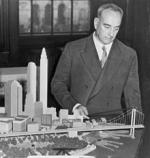Disable ads!
Robert Moses
Robert Moses (December 18, 1888 – July 29, 1981) was the "master builder" of mid-20th century New York City, Long Island, Rockland County, and Westchester County, New York. As the shaper of a modern city, he is sometimes compared to Baron Haussmann of Second Empire Paris, and was arguably one of the most polarizing figures in the history of urban planning in the United States. His decisions favoring highways over public transit helped create the modern suburbs of Long Island and influenced a generation of engineers, architects, and urban planners who spread his philosophies across the nation. One of his major contributions to urban planning was New York's large parkway network. Although Moses was never elected to any public office (his only attempt at public office came when he ran for governor of New York as a Republican in 1934 and lost by a significant margin), he was responsible for the creation and leadership of numerous public authorities which gave him autonomy from the general public and elected officials. It is due to Moses that New York has a greater proportion of public benefit corporations than any other US state, making them the prime mode of infrastructure building and maintenance in New York, accounting for 90% of the state's debt. As head of various authorities, he controlled millions in income from his projects' revenue generation, such as tolls, and he had the power to issue bonds to borrow vast sums, allowing him to initiate new ventures with little or no input from legislative bodies. This allowed him to circumvent the power of the purse as it normally functioned in the United States, and the process of public comment on major public works. Moses' projects were considered by many to be necessary for the region's development after being hit hard by the Great Depression. During the height of his powers, New York City participated in the construction of two World's Fairs: one in 1939 and the other in 1964. Moses was also in large part responsible for the United Nations' decision to headquarters in Manhattan, as opposed to Philadelphia, by helping the state secure the money and land needed for the project.
 Read more on wikipedia.org Read more on wikipedia.org
 All quotes by Robert Moses All quotes by Robert Moses
 Edit Edit
|

|
|
|
|
|
Background photo by Giuliana
|